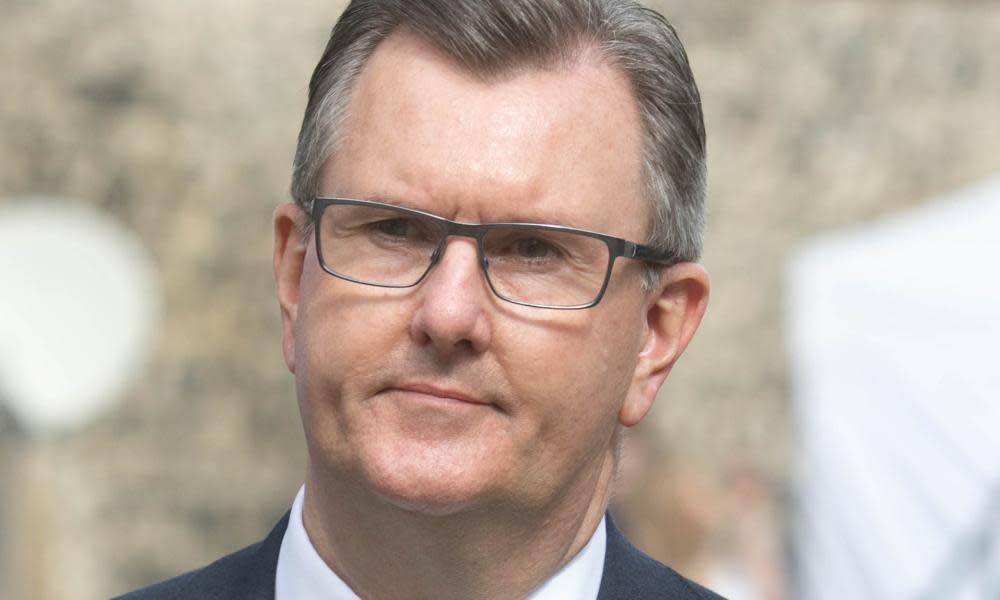DUP appears to soften stance on accepting EU regulations after Brexit

The Democratic Unionist party has for the first time signalled it is prepared to accept some post-Brexit EU rules for Northern Ireland as long as the Stormont assembly has a say.
The party’s chief whip said it was looking at regulatory alignment with the EU in the agri-food sector as a way of avoiding a hard border with Ireland.
“Where there is political will, there is certainly a way,” Jeffrey Donaldson told RTÉ’s Morning Ireland. “I think it is still possible to get that agreement.”
He said the party still had great difficulty with the proposed backstop solution because it created trade barriers between Northern Ireland and Great Britain.
But he made it clear there could be an exception: keeping the same EU rules across the island for animals and food. This would avoid disruption to the cross-border meat and dairy trade that the Ulster Farmers’ Union last week said would be a “total disaster” and force farmers out of business.
Donaldson said: “We want to avoid a hard border on the island so we are looking at ways in which we can find practical solutions that address this, in particular in areas like agri-food.
“The prime minister today as you know is meeting with Mr [Jean-Claude] Juncker to discuss these. We’ve had an input and will continue to have an input to the formulation of the proposals of the UK government which I believe are gathering apace, so I believe it is possible to find practical solutions to the concerns that not only we have but that the Irish government have as well.”
Donaldson denied a “Stormont lock” would give the DUP a veto on arrangements for Northern Ireland, saying the solution had to have “cross-community” support.
The British government’s version of Brexit involves the UK ultimately leaving the single market and customs union, requiring the return of a range of checks on goods crossing the border between Northern Ireland and the Republic of Ireland. The “backstop” is intended as a standstill placeholder to ensure such checks do not have to be imposed between Brexit happening with a deal, and the start of a new free trade agreement yet to be negotiated between the UK and the EU.
Theresa May's withdrawal agreement proposed keeping the whole of the UK in a shared customs territory with the EU during this period. An alternative idea involves only Northern Ireland staying in the EU’s customs territory. That would place a customs border in the Irish Sea. May described it as a threat to the constitutional integrity of the UK, but the new prime minister, Boris Johnson, has opened the current talks by proposing an all-Ireland agri-food zone. The suggestion is that he will seek to quietly build on that with further NI-only arrangements.
Given an NI-only backstop was an EU proposal in the first place, the U-turn would be warmly welcomed in Brussels, although attempts to give the Northern Ireland assembly a veto on its continuation would not be acceptable, and the DUP would be unlikely to support the prime minister in such a move in parliament.
If there is a no-deal Brexit, then there is no backstop.
The DUP is hoping a shift in its position will be met with a compromise by the EU and Ireland.
The Irish taoiseach, Leo Varadkar, recently said a deal on agri-food could not work on its own as it accounted for only 30% of trade and did not include non-trade elements of the backstop centring on community relations and normality of life on the border.
The deputy prime minister, Simon Coveney, has also cast doubt on a Stormont lock as the EU would not support it.
However, the tone of Donaldson’s remarks will be seen as a shift away from previously confrontational language. As recently as last week the party’s leader, Arlene Foster, dismissed reports that it would accept some form of regulatory alignment as “nonsense”.
Giving fresh insight into the DUP’s thinking, Donaldson told Morning Ireland that the answer to the Irish border lay in a joint letter by the late Sinn Féin leader Martin McGuinness and Foster in August 2016 and paragraph 50 of what is known as the December 2017 joint report between the EU and the UK.
The joint report gives Stormont a say in Northern-Ireland-specific arrangements after Brexit, while the aspirations of the McGuinness-Foster letter to Theresa May are similar to those of the backstop.
It envisaged a deal that would ensure new arrangements did not “create an incentive” to disrupt the peace process and accommodated the border’s “particular significance for the agri-food sector and animal health”.
It also noted it was critical that business was protected on the border and did not incur additional costs, and said: “… we therefore need to retain as far as possible the ease with which we currently trade with EU member states”.

 Yahoo News
Yahoo News 
